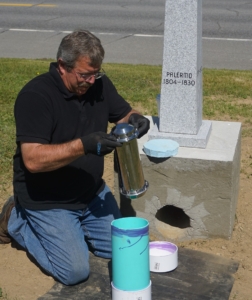Vassalboro school board had hoped to appoint new superintendent
 by Mary Grow
by Mary Grow
Vassalboro School Board members hoped to approve a new superintendent for Vassalboro at their June 19 meeting, but no one has been chosen.
Eric Haley was full-time superintendent for all three AOS (Alternative Organizational Structure) schools (Vassalboro, Waterville and Winslow) until voters dissolved the AOS in March, effective June 30. Vassalboro is now looking for a part-time superintendent, to work the equivalent of one day a week.
Haley explained that the person who is the Vassalboro search committee’s first choice is trying unsuccessfully – so far – to put together a package of jobs adding up to full-time. If that person cannot take the Vassalboro job, Haley said the search committee recommends re-advertising the position. Meanwhile, Haley offered to continue as interim superintendent until the position is filled. School board members unanimously accepted his offer.
Vassalboro Community School is also lacking a half-time Spanish teacher. New Principal Megan Allen said there have been no applicants for the position. Allen recommended advertising for someone to teach any foreign language rather than abandoning all foreign-language offerings.
School board members agreed by consensus to continue until mid-July looking for someone to continue the Spanish program, and if that search is unsuccessful to advertise for someone to teach any non-English-language class.
Board members voted reluctantly to increase 2018-19 school lunch prices by 10 cents, from $2.65 to $2.75 for a full-price lunch. Retiring Principal Dianna Gram explained that the federal government has a price formula under which Vassalboro should be charging $2.90; if the school does not move toward that goal, 10 cents at a time, federal subsidies might be reduced. More cheerfully, board members approved the 2018-19 school budget previously approved by Vassalboro voters, the 2018-19 school calendar (with a fourth snow day, Haley said) and the school board meeting schedule; several updated curricula; and appointment of Devin Lachapelle as a new math/social studies teacher. They accepted the resignation of first-grade teacher Arielle Jurdak-Roy, who is moving. Gram praised Jurdak-Roy, the teachers who worked on amended curricula and AOS #92 curriculum director Mary Boyle.
Although the AOS is officially dissolved, many of the central office staff will continue to work for one or more of the three municipalities’ schools under an interlocal agreement approved by all three school boards. Haley also recommends school administrators from the three municipalities continue to meet to share ideas, pointing out that when AOS #92 was formed, Waterville and Winslow promptly copied Vassalboro’s successful reading program.
Haley will continue as Waterville superintendent. He assured Vassalboro officials, “I’ll still be around. Obviously I’m not going to leave my friends in the lurch.”
The next Vassalboro School Board meeting is scheduled for Tuesday evening, July 17, if there is a new Vassalboro superintendent by then. If not, the next meeting is scheduled for Tuesday evening, Aug. 21.










